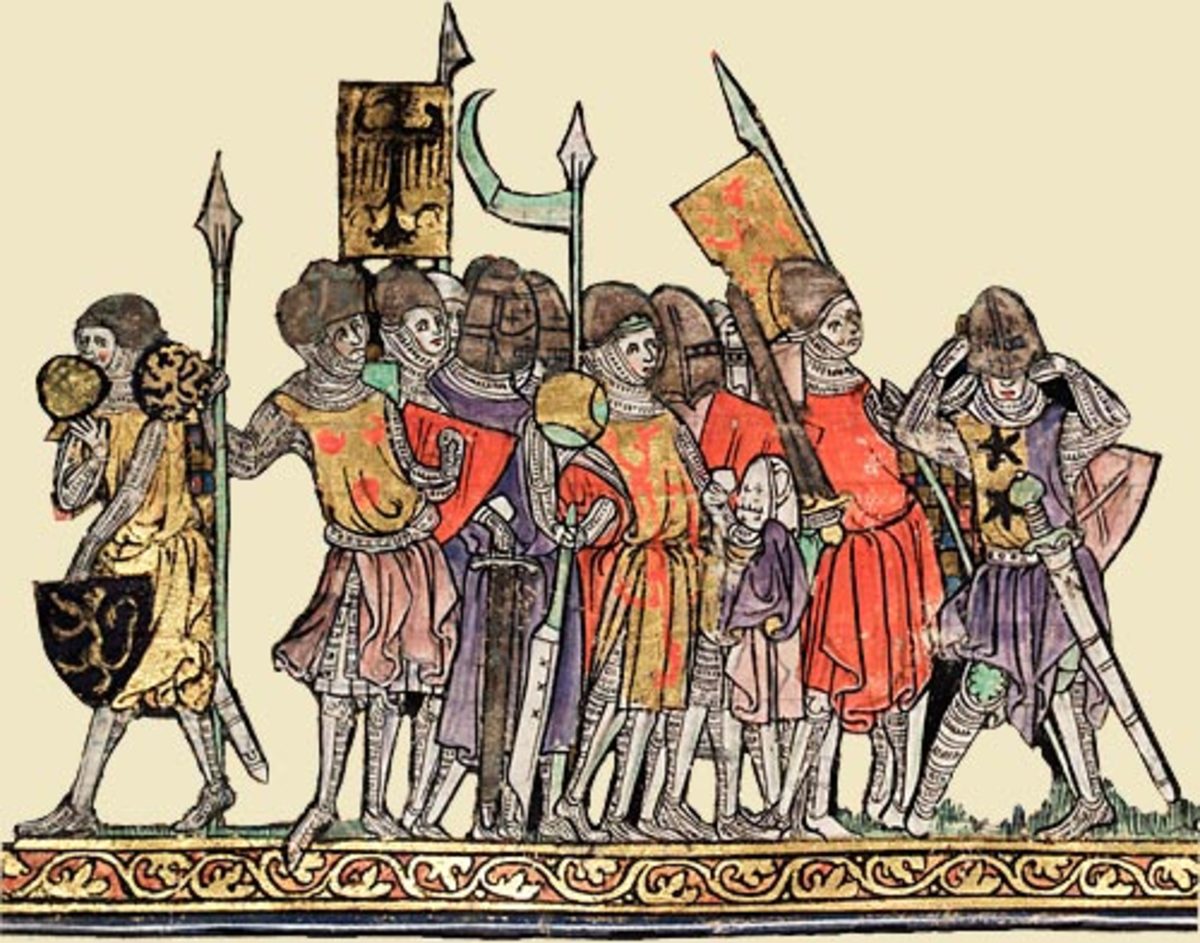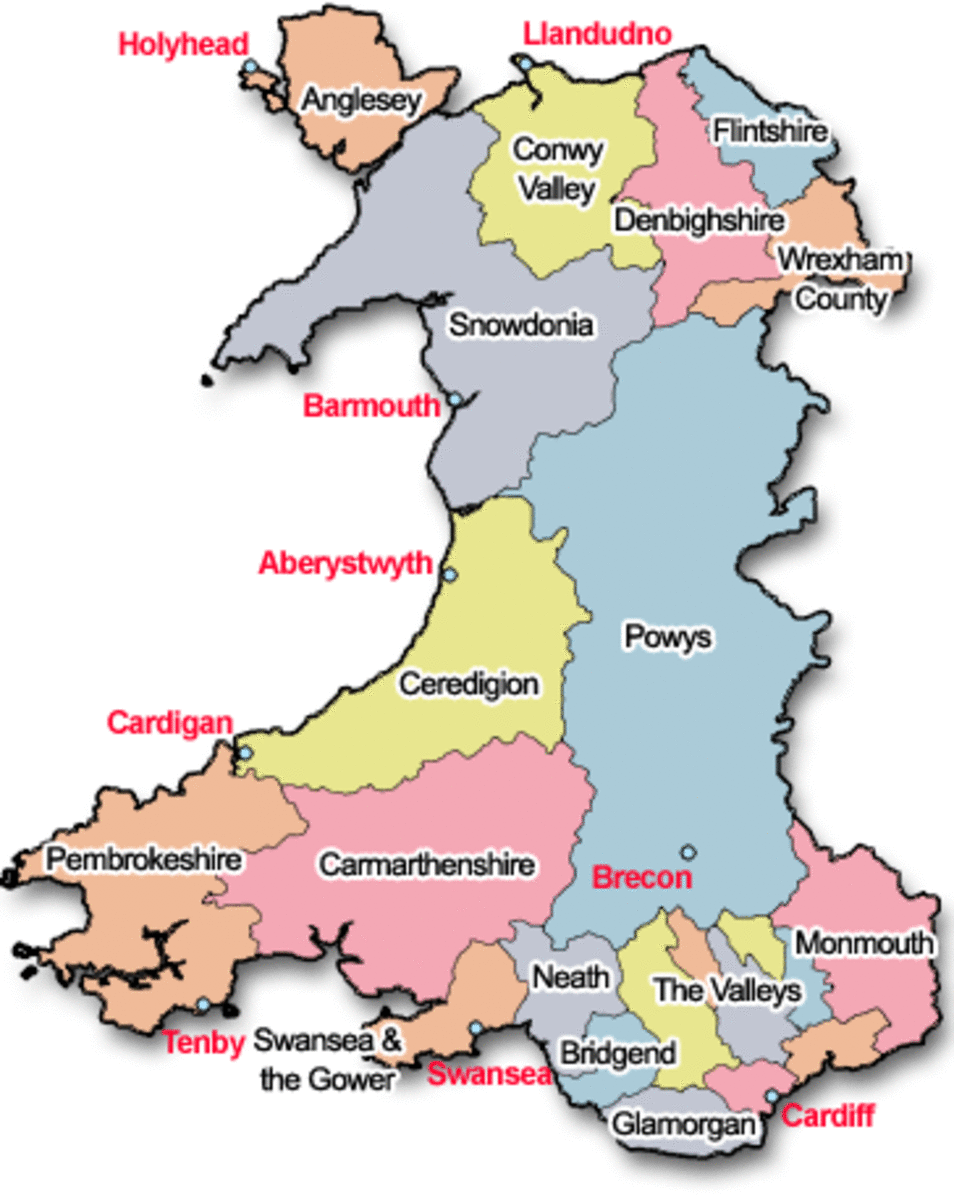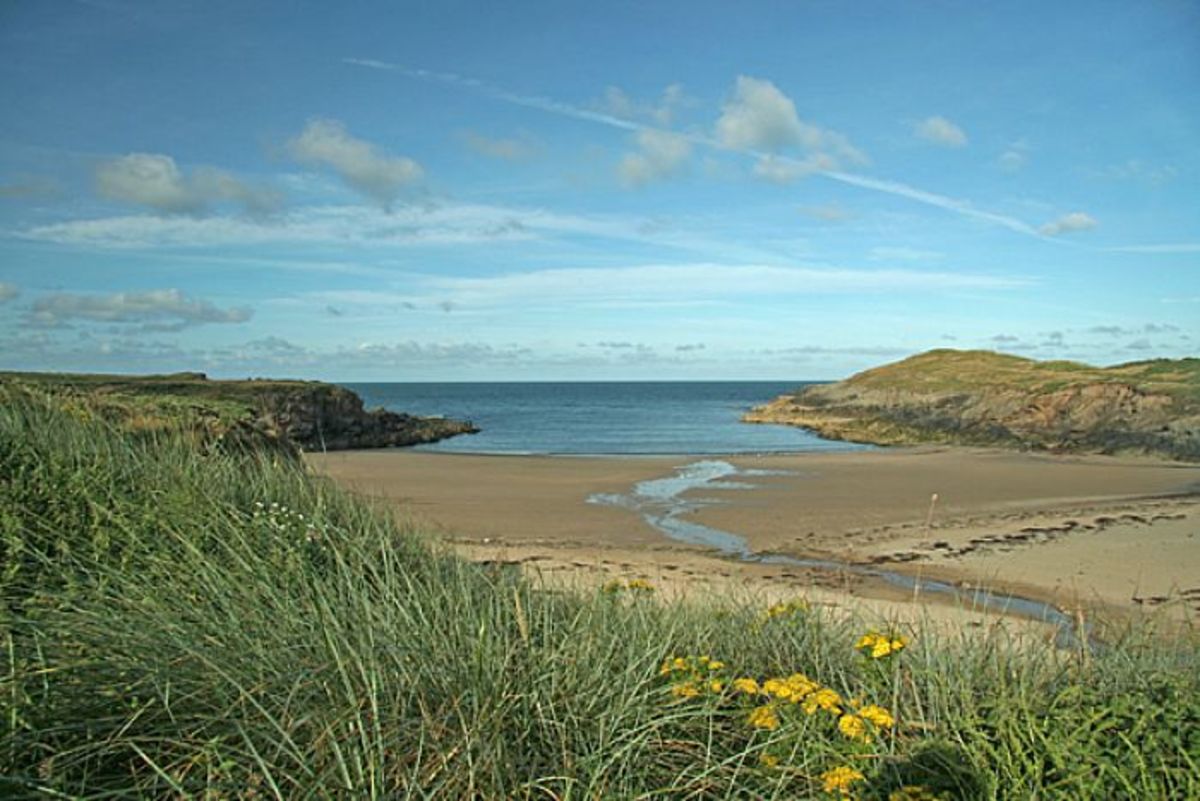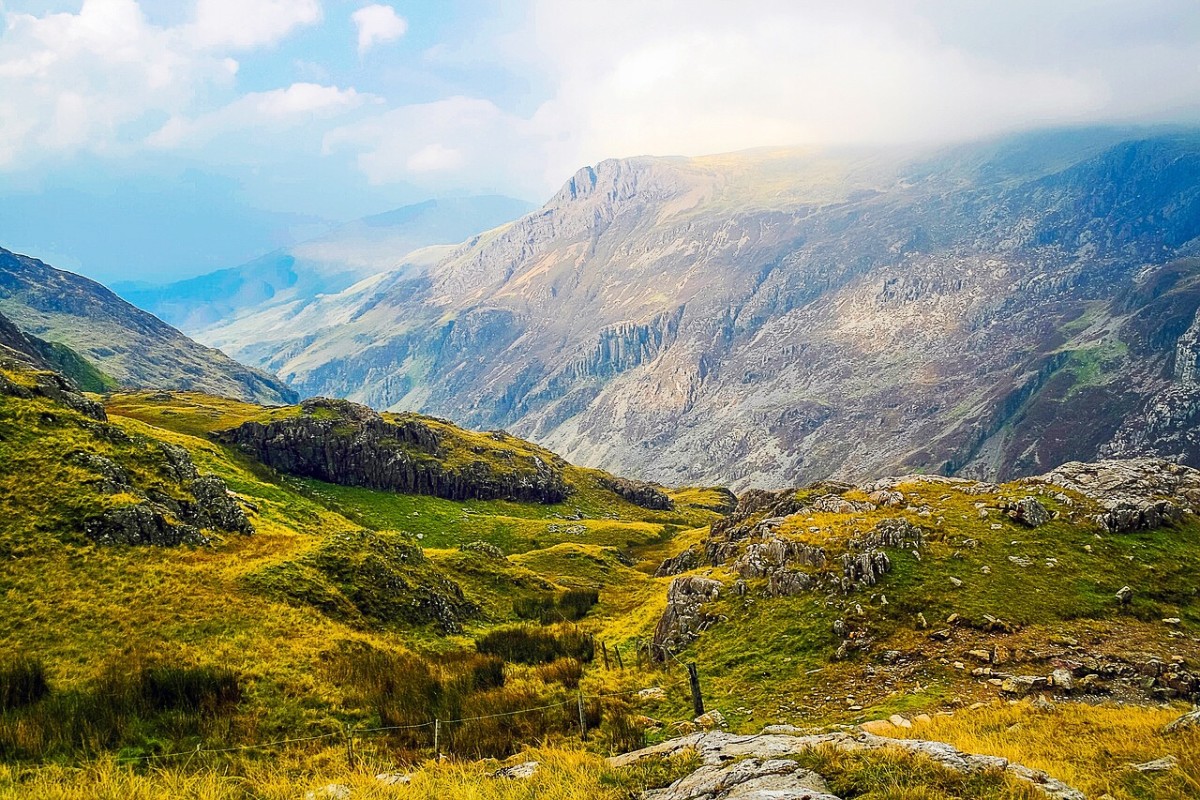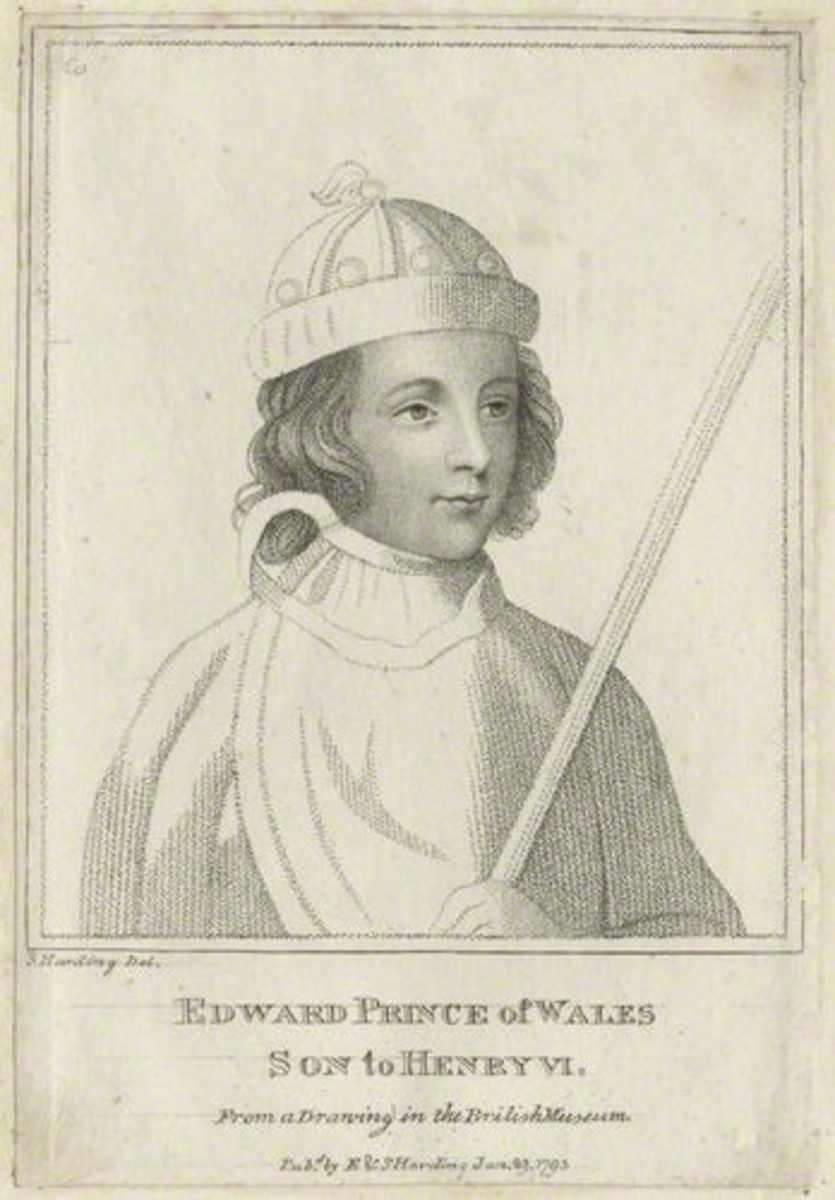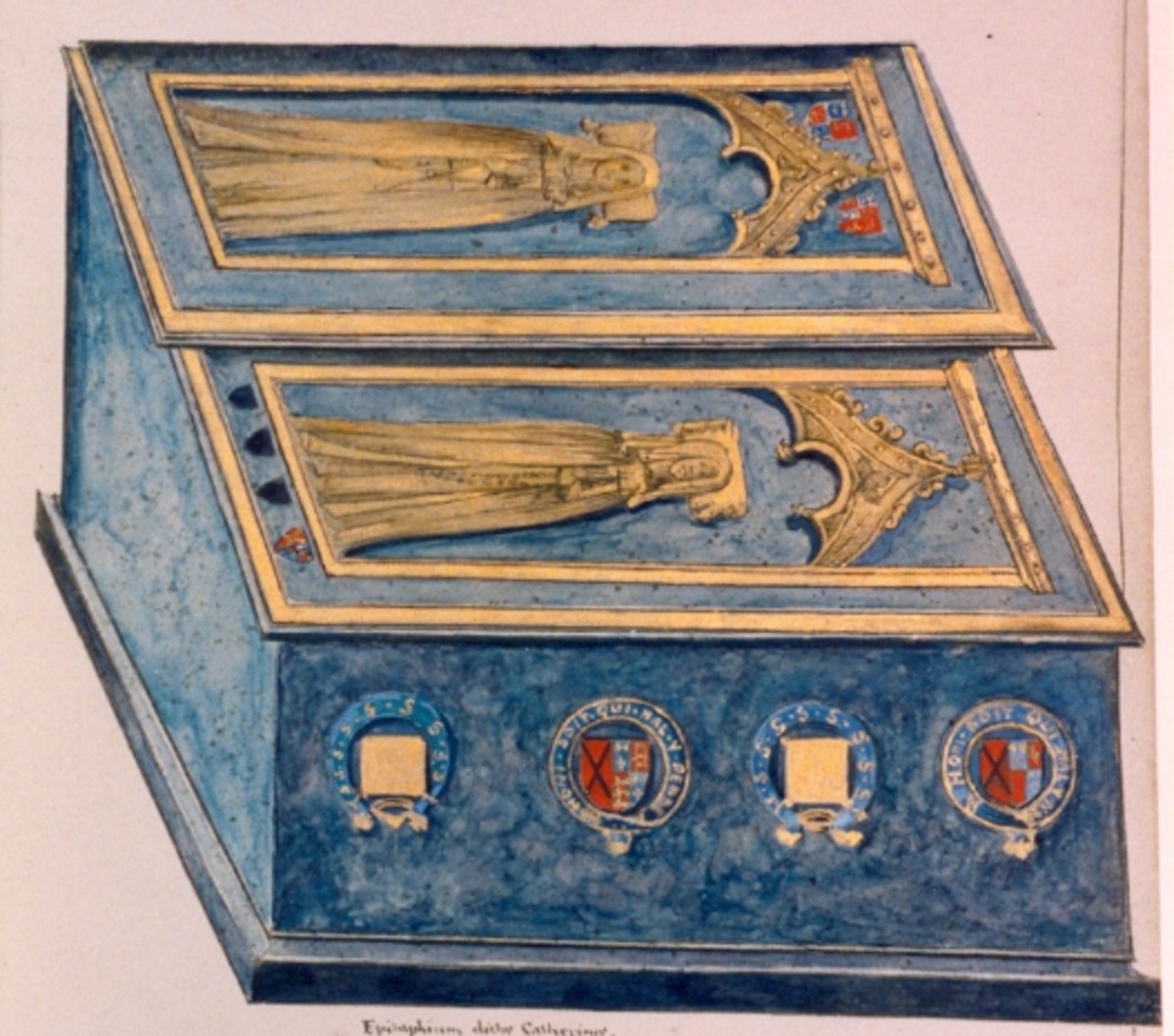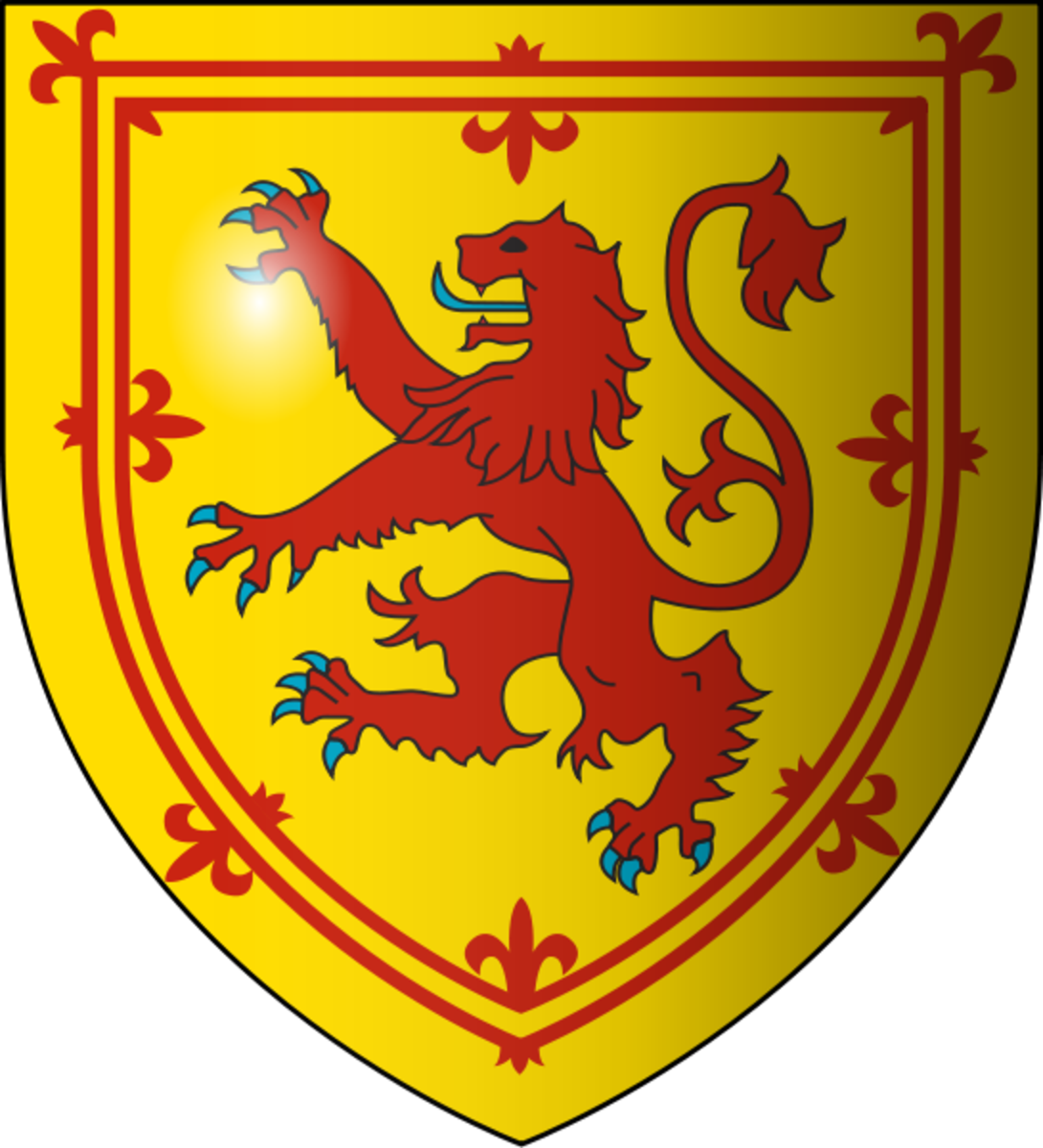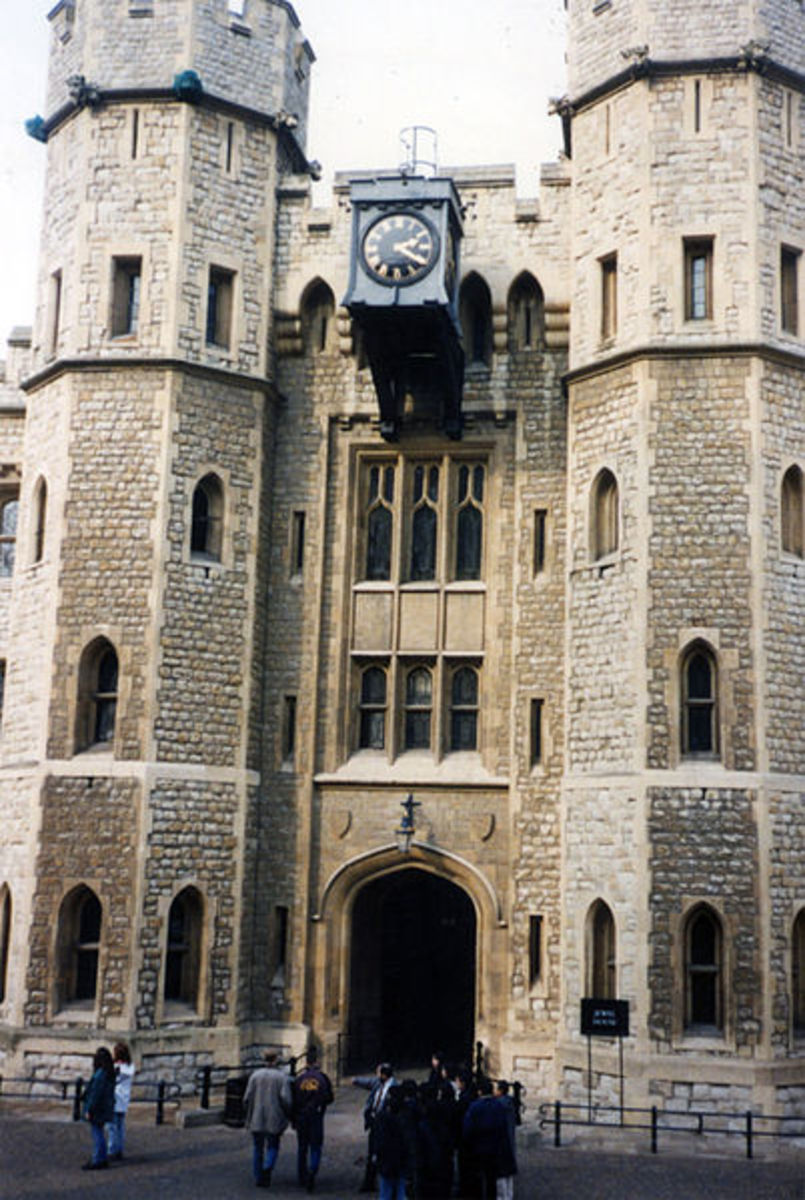Owain Glyndwr And The Fight For Wales
The Seal Of A Hero
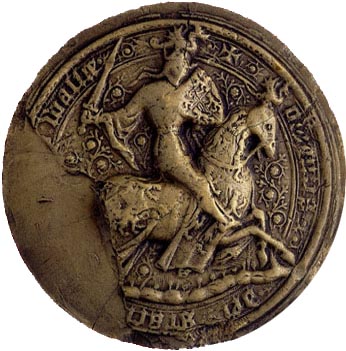
Where Is Wales?
Background
In the early 15th century, legendary Welsh prince Owain Glyndwr led a successful rebellion against the iron fisted rule of Plantagent England. In doing so, he has arguably become the most famous and legendary figure in Welsh history. Glyndwr's extraordinarily swift rise to power, and even swifter decline covered a period of just 12 years, and yet he was deemed famous enough to be included in Shakespeare's Henry IV. His heroic exploits are surely worthy enough to be included alongside the tales of other British heroes such as King Arthur and Robin Hood. What sets Glyndwr apart however, is that his accomplishments are solid historical facts, rather than myth and legend.
But how did Wales come to be ruled by the English in the first place? Glyndwr's story can be traced back to 1277, when Edward Longshanks launched an invasion of the Welsh hinterland. Within five years, what had once been a proud and independent nation, now existed only as a principality of the English crown. In order to rubber stamp his authority over the region, Edward set out on what was one of the most ambitious building projects in British history. His plan was to build what turned out to be a ring of intimidating and impregnable castles, stretching from Bulith in Central Wales, to Caernarvon in the north-west, and finally Flint in the north-east. Edward's ten formidable castles the became physical symbol of absolute English power, existing for no other purpose, other than to subjugate what had previously been a fiercely independent people..
A century later, and England remained in firm control, under the rule of Richard II. The Welsh people however, had become increasingly irritated, with the onerous taxation and restrictive land policies implemented by the ruling class. Soon, spectacular myths and legends emerged, foretelling a national saviour, a man who would rise up against the hated English and restore Welsh independence. It was out of these murmurs of discontent, that Owain Glyndwr emerged. Despite, the English enjoying a huge military superiority at the time, the Welsh under Glyndwr's charismatic direction, successfully drove the English off of their land, and thus gained a hard earned, but all too brief independence. Four centuries later, Welsh nationalism re-emerged and experienced a resurgence that continues to this day. Once again, Glyndwr's story is told across the valleys and hills with a mixture of admiration and hope.
A Full Length Documentary About Glyndwr
The Making Of A Hero
Owain Glyndwr probably wasn't the likeliest candidate for the role of Welsh saviour. He was born in 1354, into a rather affluent family, rather than the downtrodden masses. In fact, his family had royal connections, being descended from the ancient princes of Powys on the paternal line. On his mother's side, he was the heir to the lands of Rhys ap Gruffydd, one of the most powerful lords in all of Wales. And as such, Glyndwr enjoyed all of the privileges naturally bestowed on a highborn child. He studied law at the Inns in London, and became squire to the Earl of Arundel, serving with great distinction in Richard II's campaigns against the Scots. In 1383, he married Margaret Hanmer, daughter of Sir David, who served as an important justice on the King's bench. He settled down in his family homes at Sycharth and Glyndyfrdwy.
The Seeds Of Rebellion
With a healthy income, plus the protection and security afforded by a magnificent moated mansion, Glyndwr enjoyed the life of a wealthy nobleman. His mansion at Sycharth in particular, becoming a cultural utopia, frequented regularly by itinerant bards. However, events far away in London, soon brought this comfortable life to a dramatic end. They not only severely disrupted the Glyndwr clan, but more importantly altered the course of Welsh history forever. In the last year of the 14th century, Henry Bolingbrooke deposed Richard II. Almost as soon as the English crown was placed on his head, Henry IV began levying even harsher taxes against the Welsh. It couldn't have happened at a worst time, as the people were already in the grip of recurring outbreaks of plague. The new taxes exasperated the hardship and the resentment of the common folk, thus stoking the fires of rebellion further.
The situation for Owain worsened further, when an influential member of King Henry's inner circle, a certain Reginald Grey, Lord of Ruthin, seized a tract of disputed land, close to the border of Glyndwr's estate. Glyndwr, of course immediately sought legal action, but the English Parliament rebuffed his efforts, dismissing him as a 'bare-footed Welshman.'
At the same time, Henry entrusted Reginald Grey to deliver a message to Glyndwr, summoning him to join his King on yet another military campaign against the dogged Scots. Glyndwr, however never answered the call. Whether Grey had simply never delivered the message, or whether Glyndwr had chosen to defiantly ignore Henry is up for debate. Regardless of the reason, the consequences were explosive, the die had been cast. Henry, subsequently denounced Glyndwr as a traitor.
The Battle For Wales
Declaration Of War
On the 16th September 1400, Owain Glyndwr held a meeting at his home in Glyndyfrdwy, between Corwen and Llangollen. In attendance were a small band of like-minded supporters, all of whom eager to raise rebellion.
Among the group that travelled to Glyndwr's home on that day was his eldest son Gruffydd and his brother in law Philip Hanmer. They all unanimously agreed that Owain was the right Prince of Wales, and declared him thus. Four days later, Glyndwr and his small army attacked and burned the border town of Ruthin, the death toll was exceptionally high there, as apparently the attack occurred at the same time as the town fair. They also attacked and ravaged Denbigh, Ruddian, Flint, Hawarden and Oswestry before withdrawing in the face of the English army. Henry moved to declare Glyndwr an outlaw and gave his manor and lands to John Beaufort, Earl of Somerset. Although it should be noted that Somerset was unable to take possession because Glyndwr and his supporters still controlled North Wales.
News of the uprising travelled swiftly. Reportedly, Welshman studying at Oxford and Cambridge dropped their books and rushed home to join the fight. Rapidly, resentment, grew into strong hatred, with Welsh labourers working just over the border in Shropshire and Herefordshire, simply walking away from their jobs in order to support the cause. Parliament, as you would expect reacted decisively by passing even harsher laws against the Welsh people. Henry, then proceeded to march a large army across North Wales, pillaging without an ounce of mercy. In the wake of this relentless English assault, Glyndwr and his supporters fled to the safety of the mountains to bide their time.
A Lasting Memorial
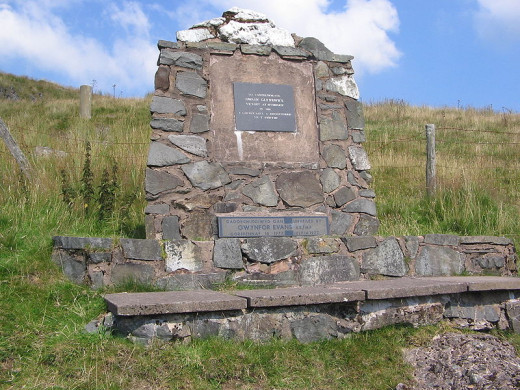
The Church Of St. Mary Today
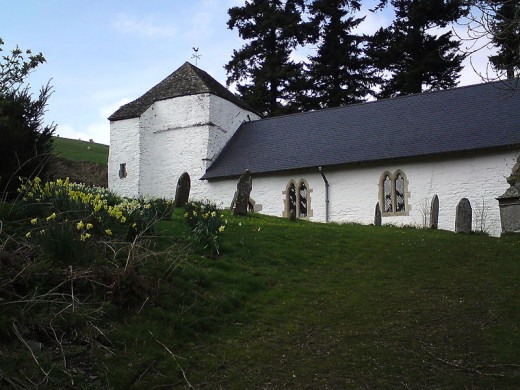
Early Successes
Owain Glyndwr won his first victory against the ruling English in the summer of 1401. At the bottom of Hyddgen Valley, he and his 500 men found themselves surrounded by an enemy force three times their number. Glyndwr had no option but to fight his way out of the valley. Amazingly, he managed to defeat the English, although he did lose virtually half of his force though.
This amazing success, achieved against incredible odds, inspired legions of new supporters, drawn mainly from the higher echelons of Welsh society. Glyndwr also received support from England's closest neighbours, who, conveniently for him, also happened to be their fiercest enemies: Scotland, Ireland and France. Meanwhile, in the midst of all this, the English continued launching strikes against Welsh settlements. One particular incident that really fuelled the fires of hatred amongst the Welsh was the brutal attack and desecration of the Cistercian monastery of Strata Florida.
In early 1402, a spectacular comet flashed above the Welsh skies. The people took it to be a sign that the legends of old would come to pass, foretelling a sweeping victory over the enemy, a victory that would restore Welsh independence forever. The prophecy seemed entirely justified, as the tide swung dramatically in Glyndwr's favour. Firstly, the Welsh captured Reginald Grey in the north of the country, holding him to ransom. They only decided to release him once the English had coughed up 10,000 marks. On the 22nd June, Glyndwr claimed his greatest victory. Sir Edmund Mortimer and his army of 2000 Englishmen had marched from the Shropshire town of Ludlow, across the Lugg Valley, ans into the heart of Wales. He spotted the Welsh assembled on a hillside, above the Church of St. Mary at Bryn Glas near Pilleth. Both armies possessed a similar array of weaponry, with the cavalrymen carrying longbows, and the foot soldiers wielding spears, axes, metal clubs, swords, and sharpened stakes.
The Welsh army was led by a fearsome man called Rhys Gethin from Conwy. It's not known for certain whether Glyndwr was present, but it seems very likely that he was. Mortimer, arrogant in his belief of an English victory stormed his forces uphill towards the awaiting Welsh. Rhys then ordered his highly mobile force to charge downhill, where they smashed into the English, engaging them in simple hand to hand combat. By the end of the day, nearly 1100 Englishmen were dead, and Mortimer, plus a number of his knights and squires were in Welsh custody.
Once the battle had ceased, the humiliated Henry refused to pay the reason for Mortimer. The likeliest reason being that Mortimer was a legitimate contender for the English throne; in fact he was probably more legitimate than Henry himself. As a consequence of the King effectively abandoning Mortimer, he formed an unlikely alliance with the man he had previously been fighting, Owain Glyndwr. Initially, the alliance was purely of a military nature, but with the marital union of Mortimer and Glyndwr's daughter Catherine, it became political. Glyndwr took advantage of the influence of Mortimer by forging alliances with Sir Henry Percy (Hotspur) and a certain Sir Reginald Grey, even going so far to offer Grey another one of his daughters for marriage.
Fall Of The Castles
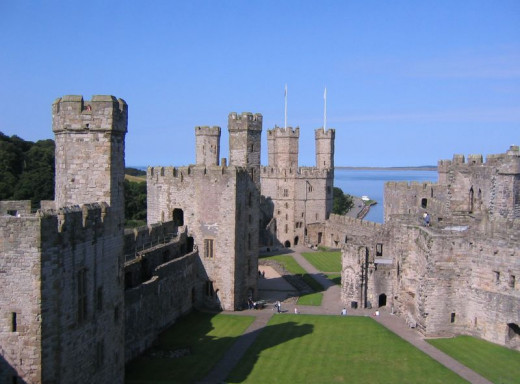
Pressing His Advantage
After the stunning victory at Bryn Glas, Glyndwr's Welsh army proceeded to take control of Glamorgan and Gwent. In response, Henry IV deployed three armies out of Shrewsbury, Hereford and Chester respectfully. However, they were all forced to retreat near the Welsh border, due to heavy storms and dense fog. Rumour were abound that Glyndwr had the ability to control the weather through the power of the magic.
Owain Glyndwr continued to take advantage of the fact that the majority of Henry's forces were committed to the war in Scotland. Continuing his military offensive, he was more or less in complete of most of the country by the end of 1403. The following year saw the English lose two of their most valuable fortresses; the mighty castles at Harlech and Aberystwyth fell, and quickly transformed into Welsh military bases.
Harlech Castle actually proved too strong for Glyndwr in terms of a military assault, so he simply besieged the castle, starving the inhabitants into submission. The English however, proved heroically stubborn, and only left when disease broke out within its walls. Aberystwyth proved easier to attack, and was easily captured by Glyndwr's forces. He remained in possession of both fortresses for several years.
Crowning The Prince
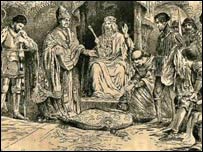
Independent Wales
With Harlech and Aberystwyth under his control, Glyndwr's power was at its greatest. Not only had he set the Welsh people free, but the presence of French ships along the coast, surely meant that the English would think twice about invading again. Glyndwr came to a decision that now was the time was right to 'receive' an official declaration of support for his claim to the Princedom of Wales. He called together a makeshift parliament, attended by representatives of every 'commote' or administrative district, plus enjoys from Scotland, France and Spain. They all unanimously agreed that Glyndwr was the rightful Prince of Wales and proclaimed him thus.
Almost immediately after the parliament was adjourned, Glyndwr moved to appoint clerics to help with the administrative side of running a fledgling nation. In July, he agreed a treaty with the French, which saw them legally recognise Welsh independence and also the formation of a military alliance. The following year however, Glyndwr suffered two crushing blows, in the form of battlefield defeats. The first occurred near Grosmont in the south of the country. The second, and altogether more devastating occurred near Usk. The English launched a surprise attack on the 15th March, secured a decisive victory, captured 300 Welsh soldiers, but more importantly succeeded in capturing Glyndwr's son Gruffydd. The 300 prisoners were dragged off to the nearest castle and executed. While Gruffydd was carted off to the Tower of London to suffer agonising torture.
More On Owain Glyndwr
The Turning Point
Later on that year, the Welsh army was bolstered by the arrival of nearly 3000 Frenchmen, which landed at Milford Haven. This ever more formidable army quickly took control of Haverfordwest, Tenby, Carmarthen, and Cardigan. Then they did something even more extraordinary, they crossed the southern Welsh border and marched into England. With his force fast approaching Worcester, Glyndwr suddenly became concerned that he had overreached and withdrew hastily. This turned out to be a crucial turning point in Welsh, and perhaps even British history, as most historians agree that if Glyndwr hadn't of turned back, then he would have defeated Henry in the inevitable battle, and from there who knows what else may have happened? Maybe England would have become the Principality, rather than Wales.
In 1406, the new Prince of Wales called another Parliament based at Pennal. He used the gathering to outline his vision for a brighter, more prosperous Wales. He advocated the establishment of Welsh universities, so that his citizens would not be dependent on Oxford and Cambridge for their education. More radically, he was keen to establish a Welsh Church, free and independent from Canterbury.
Glyndwr, at the same time wrote the famous 'Pennal Letter' to the French King. In it, he offered his support for the French Pope Benedict XIII, in return for his support of a Welsh independent church. He outlined his desire that only fluent speakers of the Welsh language could be ordained as priests and bishops, and that all monetary grants paid to English clerical institutions by Wales would cease permanently.
In the aftermath of this parliament, Glyndwr's fortunes worsened. King Henry's campaigns in Scotland has ceased, resulting in victory; which meant that now he was able to commit his full force against the Welsh. Despite their stunning victories, the English still enjoyed an overwhelming numerical advantage. Eventually, they simply overpowered the Welsh. Glyndwr's ally, the Earl of Northumberland suffered a humbling defeat, and Prince Henry, son of the King, quickly reclaimed most of the castles in southern Wales. The cruel winter of 1407 claimed the life of another crucial ally, Edmund Mortimer. Glyndwr did manage to repel the first English assault against Aberystwyth Castle, but stood little chance the following year, when the English unleashed their formidable cannon. Next to fall, was the mighty Harlech Castle, a defeat made all the more poignant, when Glyndwr learnt that his wife, children, plus the family of Mortimer had all been captured and imprisoned in London.
Despite this seemingly disastrous turn of events, Glyndwr remained defiant and keen to maintain his uprising. With south Wales lost though, he concentrated more on the north and centre of the country, where he could use the mountains as a base to harass and intimidate the English. His final battle took place in Shropshire in 1410, where not only did he lose in a military sense, but more crucially he lost more loyal supporters. Three years later, the English resumed their control over Wales, with Prince Henry, now Henry V declaring himself King. To his credit, he offered Glyndwr and his supporters a pardon, on condition that they submit to him. They stubbornly refused on two occasions, and Glyndwr, almost as if by magic vanished from history. It's thought that he died in 1415 at the home of his daughter Alice and her husband in Monington, Herefordshire.
The harsh laws that in many ways caused the Glyndwr's uprising remained in effect until 1485, when Henry Tudor, a Welshman claimed the throne after winning the Battle of Bosworth Field. The story of Owain Glyndwr quickly became shrouded in myth and legend, but it remained and remains a powerful symbol of Welsh pride, and Glyndwr is still lauded as a hero in modern times.
Welsh Independence
Should Wales become an independent country again?
© 2014 James Kenny


